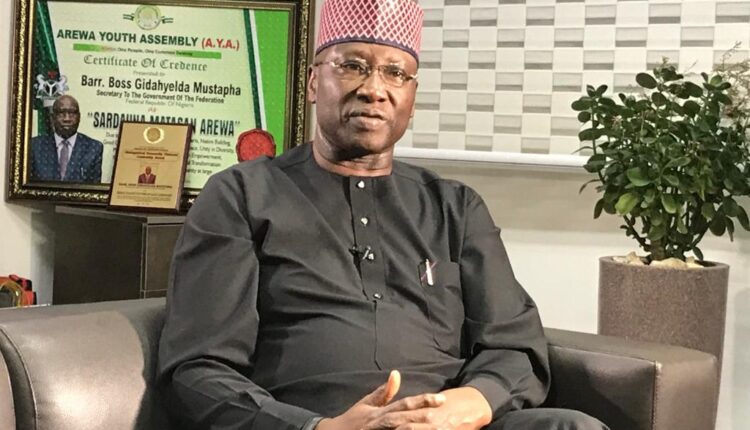Former Secretary to the Government of the Federation Boss Mustapha stated that votes that brought him victory in 2015 came from devoted supporters, despite the fact that some people elected Muhammadu Buhari president in 2015.
General Yakubu Gowon (rtd), the former head of state, characterized Buhari as a man of integrity, a man who led an austere lifestyle, and someone who was steadfast in his commitment to maintaining Nigeria’s unity.
Speaking at the book’s launch, the pair discussed Garba Shehu’s book “According to the President: Lessons from a Presidential Spokesperson’s Experience.” It provides a unique behind-the-scenes look at presidential communications and the weight of loyalty in the halls of power.
In refuting the widely held belief that the leaders of the now-defunct Action Congress of Nigeria (ACN), which is a part of the APC, were the only ones responsible for the APC’s 2015 victory, the former SGF stated that Buhari already had 12 million votes and that the merger of the legacy parties only added three million voting blocs.
To put it plainly, Buhari served as the focal point. “The votes that delivered victory in 2015 came from Buhari’s loyal followership,” Mustapha said, seemingly subtly refuting narratives about President Bola Ahmed Tinubu’s contribution to the merger’s success, even though the CPC only had one state.
According to Gowon, one of Buhari’s first acts as president was to object to a N10 million catering budget for the State House, saying it was too high and demanding a significant reduction.
“If the facts must be told, General Buhari leads a modest life. You cannot deny that he has Nigeria’s best interests at heart, regardless of the false impressions that people may have of him,” Gowon stated.
Read Also: Nigeria Secures $747 Million Syndicated Loan for Lagos–Calabar Coastal Highway
He thanked the Armed Forces for their sacrifices and commended Buhari’s administration for trying its hardest to address the nation’s growing problems, particularly insecurity.
Gowon also praised Garba Shehu for supporting Buhari’s policies consistently over the years.
“Speakers such as Malam Shehu are extremely valuable. With loyalty and bravery, Garba Shehu conveyed the president’s actions and policies in a clear and consistent manner, Gowon continued.
President Bola Ahmed Tinubu echoed Gowon’s remarks, as he was represented at the event by Senator George Akume, the Secretary to the Government of the Federation. He gave Buhari credit for instituting reforms and for having a leadership style based on responsibility, caution, and patriotism.
“Buhari left behind a legacy of focused intent to reposition Nigeria, from restoring fiscal discipline to facing insecurity head-on, from expanding infrastructure to revolutionizing agriculture,” Tinubu said.
Additionally, the President commended Nigeria’s diplomatic stability under Buhari, pointing out that his foreign policy remained principle-driven and thoughtful, with Nigeria’s voice respected throughout the African Union and the global community.
According to former Vice President Yemi Osinbajo, Shehu’s book is a critical eyewitness account of governance across two administrations.
He emphasized Shehu’s work as a media assistant and scholar, having previously taught journalism at Bayero University.
“As a teacher, he has been faithful to his calling. This book is a teaching tool for communicators, students, and political historians, according to Osinbajo. It goes beyond memoir.
Professor Ibrahim A. Gambari, a former chief of staff, was the main speaker at the launch and emphasized the book’s scholarly and policy significance.
He commended Shehu’s analysis of Buhari’s most perplexing obstacle, which is “the perception problem and the tyranny of high expectations” rather than insecurity or economic insecurity.
Gambari stated, “The book provides a road map for public servants, communication specialists, and presidential aides navigating a media landscape full of spin and false information.”
He emphasized noteworthy contributions in the book, such as a significant essay by North Dakota State University professor Charles Okigbo that examines the dangers of fake news to presidential communication tactics.
Shehu’s book has become more than just a political memoir; it is a compelling account of loyalty, moral leadership, and the fragile balance that must be maintained when defending a president.
For a leader in the social media era, taking bullets is not easy. But it is necessary to defend the truth. Shehu thought as he spoke, “I did it with pride, because I believed in the man and the mission.”

